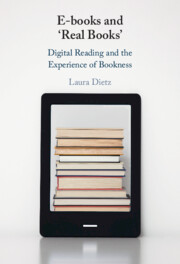E-books and ‘Real Books’
On any given day, millions of people will read e-books. Yet many of us will do so while holding them apart from ‘real books’. The fact that a book can be worthy – of our time, money, respect, even love – without being ‘real’ is a fascinating paradox of twenty-first-century reading. Drawing on original data from a longitudinal study, Laura Dietz investigates how movement between conceptions of e-books as ersatz, digital proxy, and incomplete books serves readers in unexpected ways. The cultural value of e-books remains an area of intense debate in publishing studies. Exploring the legitimacy of e-books in terms of their ‘realness’ and ‘bookness’, Dietz enriches our understanding of what e-books are, while also opening up new ways of thinking about how we imagine, how we use, and what we want from books of every kind. This title is also available as Open Access on Cambridge Core.
Laura Dietz is Lecturer in Publishing at University College London. She speaks and publishes widely on reading, authorship, and digital literary culture, serving on related prize, festival, and conference committees, editorial boards, and the Board of Directors of the Society for the History of Authorship, Reading and Publishing.

